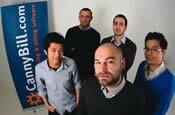Inflight Magazine of Brussels Airlines
Welcome to the Inflight Magazine of Brussels Airlines
Digital city
Image Getty Images, photolibrary.com
The future is digital, and Newcastle knows it. Marissa Peel takes a look at how this once forgotten city has risen from its industrial ashes
 If there’s one thing Newcastle is good at, it’s transformations. Twenty-five years ago, it was unimaginable that the coal city would narrowly miss out on being crowned European Capital of Culture, or be dubbed the world’s eighth most creative metropolis. Over the last two decades Newcastle has worked hard to shake off its reputation as a gloomy, poverty-stricken place and is now thriving, attracting people from across the world to its stylish streets. One sector that has helped breathe a 21st-century form of life into the city is its buzzing digital market – which is a product of Silicon Alley.
If there’s one thing Newcastle is good at, it’s transformations. Twenty-five years ago, it was unimaginable that the coal city would narrowly miss out on being crowned European Capital of Culture, or be dubbed the world’s eighth most creative metropolis. Over the last two decades Newcastle has worked hard to shake off its reputation as a gloomy, poverty-stricken place and is now thriving, attracting people from across the world to its stylish streets. One sector that has helped breathe a 21st-century form of life into the city is its buzzing digital market – which is a product of Silicon Alley.
In 1989, North East Workspace – part of the not-for-profit organisation Project North East (PNE) – revealed its vision to transform a derelict pocket of Newcastle into a vibrant hub of forward-thinking people specialising in what was then the new big thing: digital media. The company snapped up a row of abandoned 18th- and 19th-century buildings along Pink Lane and Westgate Road for a just £80,000 and set about turning the vision into reality. The plan worked, and over the following years the area attracted a new breed of digital entrepreneurs.
Offering office space for £6 to £10 per square foot, 24-hour broadband for £10 a month and an onsite centre for advice, Silicon Alley today gives 60 bright young things (employing more than 300 people) a platform to succeed. Director of North East Workspace Richard Spence says, “We’ve managed to acquire a site in a run-down area of Newcastle and make things happen, but the real measure of success is that people have moved on when they’ve out grown the place and there are now tenants all over Newcastle, employing lots of people in sustainable businesses.”
 One company that’s flourished in Silicon Alley is Dpivision.com Ltd, which moved into a prime Pink Lane spot when managing director Wladimir BaranoffRossine launched his ecommerce and web design company in 2003. Since then, the business has grown to a team of five, with PNE’s helping hand propelling it towards becoming a leader in the global online market. “We’re thriving here on Pink Lane,” says Baranoff-Rossine. “There’s cheap rent, free advice, plenty of businesses around to bounce ideas off – and we’re right in the heart of the city. There’s a lot of global work being carried out every day in these offices, and Newcastle is definitely expanding in the global market. It’s proved to be a great place to set up my business.”
One company that’s flourished in Silicon Alley is Dpivision.com Ltd, which moved into a prime Pink Lane spot when managing director Wladimir BaranoffRossine launched his ecommerce and web design company in 2003. Since then, the business has grown to a team of five, with PNE’s helping hand propelling it towards becoming a leader in the global online market. “We’re thriving here on Pink Lane,” says Baranoff-Rossine. “There’s cheap rent, free advice, plenty of businesses around to bounce ideas off – and we’re right in the heart of the city. There’s a lot of global work being carried out every day in these offices, and Newcastle is definitely expanding in the global market. It’s proved to be a great place to set up my business.”
International relations
Like many other Silicon Alley companies, Dpivision.com Ltd is now showcasing Newcastle’s new breed of business to the world. With contracts in America, Australia, Canada and France, the company has paved a way for itself in a tough international market. In 2006, it championed the city’s talent when it launched www.Tradingeye.com, one of the world’s first accessible ecommerce shopping carts. This pioneering product went on to secure a clutch of industry awards and is now used across the world, by everyone from the Ministry of Justice in Armenia and international brands Regus and Flybe to baby-product company Tommee Tippee and record label Late Night Tales.
The company’s latest venture, www.Cannybill.com, was unveiled last year and was immediately selected for the Plugg European Startup Award, where it fought off fierce competition from 126 businesses to make it to the final. The innovative online invoicing and billing solution is the start of a range of software the company has pledged to develop for businesses and web designers over the next few years.
Getting connected
 Not-for-profit organisation Codeworks has also been nurturing Newcastle’s digitally creative entrepreneurs, including Dpivision.com Ltd, since 2003. Under its Codeworks Connect arm, digital companies can network, attend courses and conferences with industry speakers, seek advice and apply for funding. A pioneering programme where graduates from the city’s universities – Northumbria and Newcastle – are given work placements with local digital companies has also proved a hit, with more than 400 students taking advantage since it launched three years ago. What’s more, 85 per cent have gone on to be offered permanent jobs.
Not-for-profit organisation Codeworks has also been nurturing Newcastle’s digitally creative entrepreneurs, including Dpivision.com Ltd, since 2003. Under its Codeworks Connect arm, digital companies can network, attend courses and conferences with industry speakers, seek advice and apply for funding. A pioneering programme where graduates from the city’s universities – Northumbria and Newcastle – are given work placements with local digital companies has also proved a hit, with more than 400 students taking advantage since it launched three years ago. What’s more, 85 per cent have gone on to be offered permanent jobs.
Software development is an additional area of expertise, and in a bid to get the creative juices flowing, anyone able to offer a top idea for developing an application can access funding, as well as a helping hand in turning it into reality. Since it launched three years ago, six companies have been created.
Getting people talking about Newcastle is another of Codeworks’ aims, and in 2007 founder Herb Kim launched Thinking Digital, a three-day conference that last year attracted more than 600 people from as far afield as America, South Africa, South Korea, India and China. “It was about putting on a conference that would inspire the technology ideas of our future,” says Kim. “We create an immersive environment that opens the mind to new thinking and people, which in turn stimulates ideas for attacking the challenges in our personal and professional lives.” And with this year’s conference, which takes place on 25-27 May (www.thinkingdigital.co.uk), set to be even bigger, it looks like the whole world will soon be talking about Newcastle’s exploding digital scene.
FR Ville numérique
Le futur sera numérique, et Newcastle en sait quelque chose. Marissa Peel analyse la façon dont cette ville, autrefois oubliée, renaît aujourd’hui de ses cendres industrielles.
Après deux décennies d’efforts passés à gommer sa réputation de ville glauque, Newcastle attire à nouveau aujourd’hui des habitants du monde entier dans ses rues de caractère – et le secteur qui a insufflé une nouvelle vie à la cité est sans conteste le marché des technologies numériques.
En 1989, North East Workspace – qui fait partie du Project North East (PNE) – a fait raser un bloc de bâtiments à l’abandon dans un quartier délabré de Newcastle pour y instaurer un hub vibrant, qui puisse propulser la ville dans le futur des médias numériques. Et cela a marché. En offrant des espaces de bureaux à des prix abordables et des conseils gratuits, ce ‘Silicon Alley’ offre aujourd’hui à 60 entrepreneurs du secteur – employant plus de 300 personnes – une plateforme gagnante. Dpivision.com Ltd, une compagnie d’e-commerce et de web design fondée en 2003, en est un exemple. “Nous grandissons à toute vitesse,” confie son directeur Wladimir Baranoff-Rossine. “On trouve ici des loyers modérés, des conseils professionnels gratuits et une foule d’opportunités commerciales… Newcastle se positionne définitivement comme un acteur important dans le marché global.”
L’association sans but lucratif Codeworks alimente également les entrepreneurs du numérique à Newcastle. Sous sa branche Codeworks Connect, les sociétés peuvent faire partie d’un réseau, chercher du conseil et introduire des demandes de financement. En outre, un programme d’emploi pour les diplômés des deux universités de la ville a été développé avec succès. À cela, il faut ajouter que toute personne susceptible de fournir une super idée pour une application logicielle peut obtenir un soutien financier ainsi qu’une aide à la réalisation pour mener à bien son projet. En 2007, le créateur de Codeworks, Herb Kim, a lancé Thinking Digital, une conférence qui a attiré l’année dernière plus de 600 personnes venues d’horizons aussi lointains que les Etats-Unis, l’Afrique du Sud, la Corée du Nord, l’Inde et la Chine. Et ce mois-ci, la conférence qui se déroulera du 25 au 27 mai, (thinkingdigital.co.uk) devrait être un événement encore plus prestigieux : bientôt, le monde entier pourrait bien parler de la nouvelle scène numérique de Newcastle.
NL Digitale stad
De toekomst is digitaal en dat beseft Newcastle maar al te goed. Marissa Peel bekijkt hoe deze eens vergeten stad uit zijn industriële as is verrezen.
Newcastle heeft twee decennia lang een mistroostig imago van zich afgeschud en trekt nu mensen aan van overal ter wereld die de stijlvolle straten van de Engelse stad komen ontdekken. Eén sector in het bijzonder heeft de stad nieuw leven ingeblazen: de digitale markt.
In 1989 knapte North East Workspace – als onderdeel van Project North East (PNE) – een rij verlaten gebouwen op in een verwaarloosde buurt van Newcastle. Daarmee begon de opbouw van een levendige broeihaard van het nieuwe gouden kalf: digitale media. En of het een succes werd! ‘Silicon Alley’ biedt betaalbare kantoorruimte en gratis advies aan 60 digitale ondernemers – met meer dan 300 werknemers – en is een heus platform richting digitaal succes. Een voorbeeld van een bedrijf dat het helemaal gemaakt heeft, is Dpivision.com Ltd, dat werd opgericht in 2003 en gespecialiseerd is in e-commerce en web design. “De zaken gaan erg goed,” zegt gedelegeerd bestuurder Wladimir Baranoff-Rossine. “Goedkoop huren, gratis advies, heel wat bedrijven in de buurt, … Newcastle is vast en zeker aan een opmars bezig op de globale markt”.
Ook de non-profitorganisatie Codeworks stuwt de digitale entrepreneurs van Newcastle voorwaarts. Via Codeworks Connect kunnen bedrijven netwerken, advies uitwisselen en fondsen aanvragen. En een programma waarbij afgestudeerden van de twee universiteiten die de stad rijk is aan de slag gaan in de bedrijven van Silicon Alley, is eveneens een schot in de roos. Sterker nog, iedereen die een uitstekend idee kan voorleggen over een softwareapplicatie kan er aanspraak maken op kapitaal en voldoende helpende handen om dat idee om te zetten in de praktijk.
In 2007 lanceerde de oprichter van Codeworks, Herb Kim, de conferentie Thinking Digital die vorig jaar meer dan 600 mensen naar Newcastle lokte. Er waren bezoekers uit Amerika, Zuid-Afrika, Zuid-Korea, India en China. De conferentie van deze maand belooft nog grootser te worden (25 tot 27 mei, thinkingdigital.co.uk). Het ziet er dan ook naar uit dat de hele wereld het binnenkort over de digitale zakenwereld van Newcastle zal hebben.
Leave a Reply
